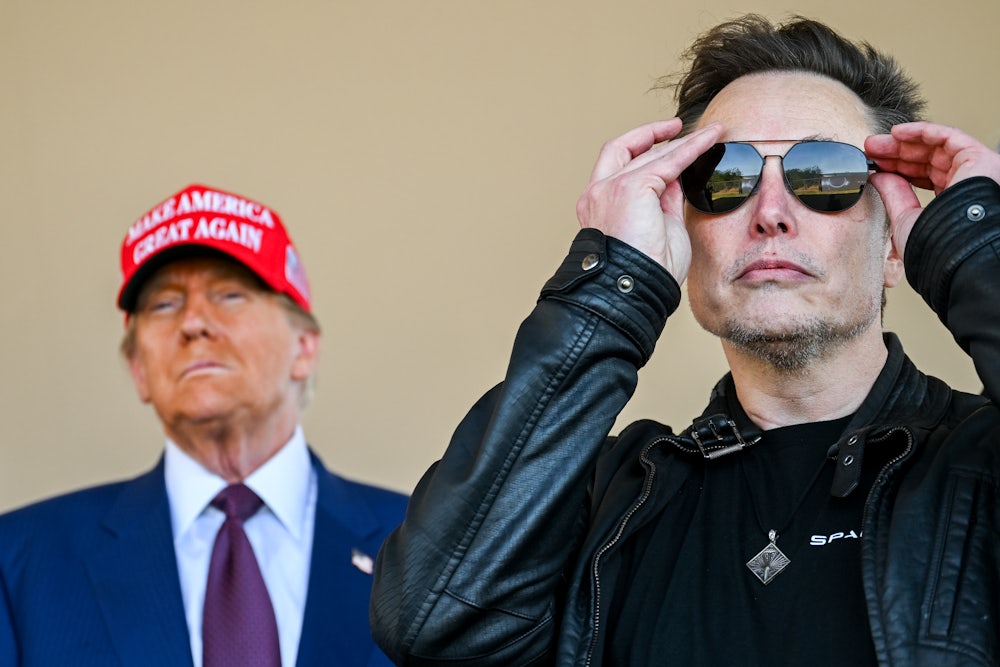Elon Musk, after months omnipresent in the White House, was nowhere near the Oval Office on May 20 when Donald Trump announced his new “Golden Dome” space weapons system. He didn’t have to be. He had already maneuvered his companies to benefit substantially from the $25 billion Trump said he would spend immediately and the hundreds of billions in federal contracts the new effort will spawn.
Though Musk has largely disappeared from Washington and Trump’s media feeds, his influence lives on. Earlier this month, the acting inspector general at the Department of Defense got a letter asking for a probe into Musk’s lobbying on Golden Dome from 42 congressional Democrats, including the late Representative Gerry Connolly in one of his last acts as the ranking Democrat on the House Oversight and Government Reform Committee.
The members believe that Musk’s “formal or informal participation in any process to award a government contract raises serious conflict of interest concerns, including the possibility that SpaceX is a top contender for the Golden Dome contract because of Mr. Musk’s position in the government.”
This, they said, “raises concerns about whether defense contracts to build a Golden Dome are an effective way to protect Americans or are meant to enrich Mr. Musk and other elites.”
Their fears are well grounded. Though the 60-year pursuit of an effective national missile defense system began with an ideological desire to replace arms-control agreements with a military shield, for decades, the primary driver has been the pursuit of lucrative contracts.
Musk understands that there is a lot of money to be made in missile defense. The program has grown from a relatively modest $3 billion a year, back when Ronald Reagan first started talking it up during the 1980s, to over $30 billion a year for “missile defense and defeat programs” today. Since the development of the first interceptors in 1962, the government has spent more than $531 billion on “multiple ineffective missile defense schemes,” according to Stephen Schwartz, a nuclear budget analyst. Over $453 billion of that was spent in failed efforts launched by Reagan in 1983 to fulfill his fantasy of a shield that could “protect us from ballistic missiles just as a roof protects a family from rain.”
All we have to show for the effort is 44 ground-based interceptors in Alaska and California that are so flawed that the Pentagon last year awarded Lockheed Martin an $18 billion contract to build a brand-new replacement system. While missile defenses against short-range rockets, like those Hamas fired into Israel, can be effective, no country has built a system that can reliably shoot down nuclear missiles that travel thousands of miles at many times the speed of sound.
Trump claims that Reagan “didn’t have the technology,” but now we have “super technology” that will provide “close to 100 percent protection” against “hypersonic missiles, ballistic missiles, and advanced cruise missiles; all of them will be knocked out of the air.” Even better, said Trump, the whole thing will only cost $175 billion and be “fully operational before the end of my term.”
This is all nonsense, of course. The Congressional Budget Office estimates that a Golden Dome system would cost as much as $831 billion over two decades. Scientists warn that even if all the complex technology and computer software works flawlessly, an adversary could defeat the defenses by simply launching a salvo of missiles that would overwhelm the system and deploying basic countermeasures that could spoof the sensors.
Whether the systems works or not doesn’t matter for the contractors who get rich on contracts to design, develop, and deploy these weapons. That may be why Musk has partnered with two other companies owned by Trump supporters, software maker Palantir and drone builder Anduril, to help design and build the system. Musk’s company estimates that the initial design contracts alone could be worth between $6 billion and 10 billion, according to Reuters.
Think of it as a “pump and dump” scam, where investors buy a cheap stock, inflate its value with hype and exaggerated expectations, then get rich by selling the stock at the inflated levels. Here, contractors and their government supporters take an old, devalued concept, pump up its value with exaggerated promises of instant success, secure big, multiyear contracts to build it, then get even more contracts for more systems when the ones they built don’t work.
SpaceX is lobbying the Pentagon to win the contract for the “custody layer” of the proposed system. That would involve launching thousands of satellites into orbit to detect missile attacks. It might also include hundreds or thousands of satellites that would attempt to intercept these missiles as they rise through the atmosphere. Reuters reported that one of the sources familiar with the talks described them as “a departure from the usual acquisition process. There’s an attitude that the national security and defense community has to be sensitive and deferential to Elon Musk because of his role in the government.”
Trump’s call for the accelerated deployment of the system also benefits SpaceX, which is the world’s leader in space launches. This rapid schedule “could advantage Mr. Musk’s companies and could result in a faulty end product,” warn the congressional Democrats in their letter, “that wastes billions of dollars and leaves our country with a false sense of security.”
There are also reports that SpaceX is pushing for a “subscription model” for Golden Dome, similar to Musk’s Starlink system. Musk would own the satellites and lease them to the government, ensuring lucrative payments for years to come. “A subscription model would also give Mr. Musk unacceptable ongoing leverage over United States national security. Mr. Musk could, as he allegedly did in Ukraine, determine when to provide the U.S. government with access to Golden Dome satellite systems,” say the Democrats.
Musk’s activities may violate government ethic rules against using a public office for private gain and criminal prohibitions against participating in government decisions in which he has a financial interest, the Democrats assert in their letter. So far, there is no move in the administration to block Musk’s activities.
National missile defense is the longest-running scam in the history of the Department of Defense. Musk didn’t invent it, but he’s about to get a whole lot richer by perpetuating it.






